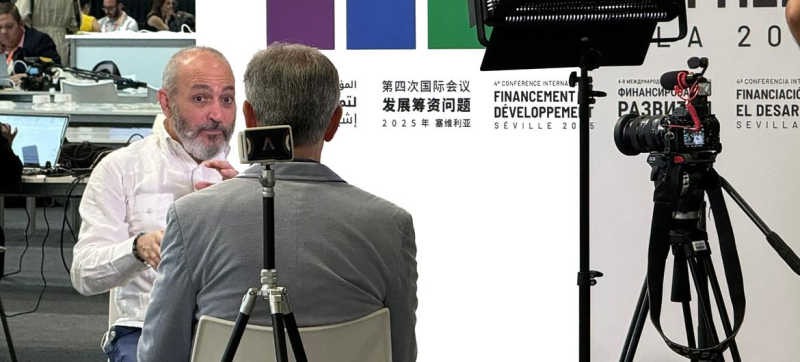- Militant Attacks Kill 33 in Balochistan; 92 Assailants Dead |
- Power generation at Payra Thermal Power Plant 1st unit starts after a month |
- Irregularities, injustice will no longer be accepted in politics: Jamaat Ameer |
- 2 arrested in Jhenaidah for allegedly selling madrasa student |
- Koko’s wife campaigns for Tarique in Dhaka-17 |
Sevilla pact links development to global hope and security

UN Assistant Secretary-General Marcos Neto, Director of UNDP’s Policy and Programme Support.
A senior UN official has told UN News that the global development challenge is not the lack of money, but how to align public and private capital flows. The Sevilla Agreement, adopted this week, sets out a roadmap for all UN Member States — except the US, which pulled out earlier this month — with the aim of mobilising that capital.
Development benefits all countries because it is linked to other areas of activity and society, including basic security. Without it, there is no hope — and no stability.
That is the key message from Marcos Neto, Director of the UN Development Programme's Bureau for Policy and Programme Support (UNDP), to all nations gathered in Sevilla who have signed up to the plan of action, which gets underway immediately.
The Sevilla Agreement is the centrepiece of the 4th International Conference on Financing for Development and has been adopted by 192 of the 193 UN members.
The United States withdrew, citing fundamental disagreements with many policy approaches, and is absent from the summit taking place amid scorching temperatures in the southern city of Sevilla, Spain.
In his interview during the conference, we asked Mr Neto to explain in plain language what the Sevilla Commitment is all about.
Marcos Neto: We are five years away from the Sustainable Development Goals (SDGs). One of the biggest obstacles to this shared agenda of global solidarity is financing. In other words: where is the money? Where will it come from?
The Sevilla Commitment is a document that makes it clear that this is not about a lack of money — it's about aligning public and private capital flows toward those Goals, the Paris Agreement, and other international commitments.
The commitment outlines what to do with every kind of money — national, international, public, and private. It is a roadmap agreed upon through consensus among UN Member States, involving the private sector, civil society, and philanthropy.
UN News: One of the major absences at this conference was the United States, which left the negotiations. How did Washington’s withdrawal affect the outcome?
Marcos Neto: Consensus among 192 countries was reached and approved here. Clearly, the United States is one of the world’s largest economies and holds significant weight. I believe it’s crucial to keep the dialogue open and continue engaging all Member States, according to their needs.
For example, development financing is directly linked to security. Without development, you cannot have a stable society. What’s your level of poverty? What’s your level of inequality? Development is a security strategy. Development is hope. A people without hope is a people in trouble.
UN News: At conferences like this, documents are often adopted, but people feel they don’t affect their lives. What would you say to citizens to convince them these decisions matter?
Marcos Neto: I’ll give you a very clear example. At the last Conference on Financing for Development ten years ago in Addis Ababa, a phrase envisioned the creation of what we now call Integrated National Financing Frameworks (INFFs). We at UNDP developed this concept in 86 countries. This is real: $47 billion was aligned and mobilised through that mechanism.
So, in practice, I can say we’ve helped put more than $50 billion into the hands of countries. We’ve also helped them reform their national budget processes so the money reaches where it’s supposed to go.
Our current commitment is to implement the Sevilla Commitment. We are committed to delivering on it.
UN News: In addition, the Sevilla Platform for Action will also help implement several initiatives…
Marcos Neto: Yes, we are leading 11 of the initiatives under the Sevilla Platform. I think it was a great move by the Government of Spain to create this action platform to turn commitments into implementation.
It’s very similar to what Brazil wants to do at the end of the year at COP30. There is a direct connection between Sevilla and Belém — the host city of the UN Climate Change Summit in Brazil later this year. These connections are important.

